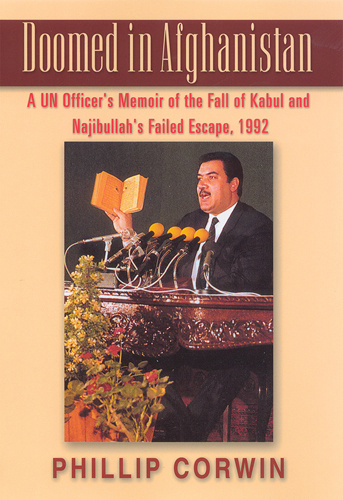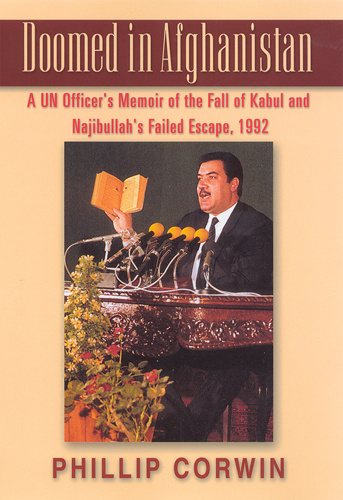Our shopping cart is currently down. To place an order, please contact our distributor, UTP Distribution, directly at utpbooks@utpress.utoronto.ca.
Doomed in Afghanistan
A U.N. Officer's Memoir of the Fall of Kabul and Najibullah's Failed Escape, 1992
To understand more deeply the tragic events of September 11, 2001, it is critical to know Afghanistan’s recent and turbulent past. Doomed inAfghanistan provides a first-hand account of how failed diplomacy led to an Islamic fundamentalist victory in a war-torn country, and subsequently, to a Taliban takeover and a home for Osama bin Laden’s Al Qaeda terrorist network.
In April of 1992, Phillip Corwin was part of a United Nations team in Afghanistan whose mission was to help ensure the transfer of power from the Soviet-installed communist regime of President Najibullah to an interim government (that would prepare for elections). Without the support of the Soviet Union, Najibullah’s regime crumbled, and he was convinced to resign in favor of a national unity government, with the understanding that he would be evacuated to a neutral country (India). Due to a series of miscalculations and machinations, the U.N.’s diplomatic mission failed. Kabul fell to groups of mujahiddin before Najibullah could be evacuated. The inability of the various mujahiddin factions to unite led to their eventual defeat by the Taliban, who four years later routed Najibullah from his safe haven at the U.N. compound, and executed him.
Corwin gives a vivid account of the seminal event of Najibullah’s failed evacuation and the frenzied negotiations that were unable to forestall the anarchy and chaos that followed.
Former U.N. official Phillip CorwinÆs Doomed in Afghanistan is a fast paced diary that reads like a thriller, recounting the bloody endgame to the ill-fated Soviet invasionàthe book closes with both an examination of U.N. documents relating to the conflict in Afghanistan and a post-Sept. 11 epilogue that brings the story up to the present moment.
A fast-paced diary that reads like a thriller.
This articulate and engaging book conveys an important and highly topical message in a bold and uncompromising fashion. Corwin emerges as a shrewd observer of the dynamics of diplomacy, one who is honest in his criticism of the UN because of his commitment to the highest humanitarian goals.
Preface
Acknowledgments
Glossary
Waiting for the end: Kabul, 4/92 (poem)
Setting the Stage
The Journal: April 1992
The View from UN Headquarters
Seven Years After: An Interview with Afghan Expatriates
Epilogue: After the Events of 11 September 2001
Notes
Selected Bibliography
Index





